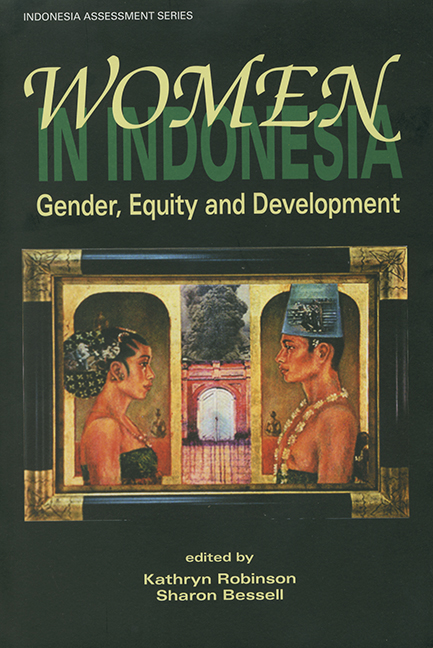Book contents
- Frontmatter
- Contents
- Tables
- Figures
- Contributors
- Acknowledgments
- Glossary
- Prologue
- 1 Introduction to the Issues
- 2 The Mega Factor in Indonesian Politics: A New President or a New Kind of Presidency?
- 3 The Downfall of President Abdurrahman Wahid: A Return to Authoritarianism?
- 4 The Year in Review: From Blind Man's Bluff to Mega Expectations
- 5 Further Comments on the Economy, with a Gender Perspective
- 6 Institution Building: An Effort to Improve Indonesian Women's Role and Status
- Commentary
- 7 Feminism in Indonesia in an International Context
- 8 Gay and Lesbi Subjectivities, National Belonging and the New Indonesia
- 9 And the Winner Is … Indonesian Women in Public Life
- 10 Indonesian Women Artists: Transcending Compliance
- 11 Literature, Mythology and Regime Change: Some Observations on Recent Indonesian Women's Writing
- 12 Women and the Labour Market during and after the Crisis
- 13 Women's International Labour Migration
- 14 Customary Institutions, Syariah Law and the Marginalisation of Indonesian Women
- 15 Women's Grassroots Movements in Indonesia: A Case Study of the PKK and Islamic Women's Organisations
- 16 Women's Activism against Violence in South Sulawesi
- 17 Gender Mainstreaming and Sex-disaggregated Data
- 18 The Changing Indonesian Household
- 19 Women, Family Planning and Decentralisation: New Variations on Old Themes
- 20 Men, Women and Community Development in East Nusa Tenggara
- References
- Index
- INDONESIA ASSESSMENT SERIES
16 - Women's Activism against Violence in South Sulawesi
Published online by Cambridge University Press: 21 October 2015
- Frontmatter
- Contents
- Tables
- Figures
- Contributors
- Acknowledgments
- Glossary
- Prologue
- 1 Introduction to the Issues
- 2 The Mega Factor in Indonesian Politics: A New President or a New Kind of Presidency?
- 3 The Downfall of President Abdurrahman Wahid: A Return to Authoritarianism?
- 4 The Year in Review: From Blind Man's Bluff to Mega Expectations
- 5 Further Comments on the Economy, with a Gender Perspective
- 6 Institution Building: An Effort to Improve Indonesian Women's Role and Status
- Commentary
- 7 Feminism in Indonesia in an International Context
- 8 Gay and Lesbi Subjectivities, National Belonging and the New Indonesia
- 9 And the Winner Is … Indonesian Women in Public Life
- 10 Indonesian Women Artists: Transcending Compliance
- 11 Literature, Mythology and Regime Change: Some Observations on Recent Indonesian Women's Writing
- 12 Women and the Labour Market during and after the Crisis
- 13 Women's International Labour Migration
- 14 Customary Institutions, Syariah Law and the Marginalisation of Indonesian Women
- 15 Women's Grassroots Movements in Indonesia: A Case Study of the PKK and Islamic Women's Organisations
- 16 Women's Activism against Violence in South Sulawesi
- 17 Gender Mainstreaming and Sex-disaggregated Data
- 18 The Changing Indonesian Household
- 19 Women, Family Planning and Decentralisation: New Variations on Old Themes
- 20 Men, Women and Community Development in East Nusa Tenggara
- References
- Index
- INDONESIA ASSESSMENT SERIES
Summary
Violence against women was a neglected issue in Indonesia before 1998 (Blackburn 1999). The women's movement in the reform era has focused on the issue of violence against women in both the public and the domestic sphere, including harassment of female labourers. Street demonstrations have been organised by women's groups to protest against violence, including the widespread campaigns across Indonesia following the May 1998 riots in which over a hundred Chinese Indonesian women were brutally raped. The exact numbers are unclear, but Sumardi (1998: 20) claims that 168 women were raped, 152 from Jakarta and its surrounds and the rest from Solo, Medan, Palembang and Surabaya. Blackburn (1999) argues that the May riots enabled Indonesian women's organisations to draw public attention to the issue of violence against women. Heryanto (2000: 59) says that although the state was not solely responsible for all that took place, state violence was the dominant factor in the May riots.
This chapter examines the efforts of women activists in South Sulawesi to end violence against women, from the time of Soeharto's New Order to the era of ‘Mutual Help’ (Gotong Royong) under Megawati's presidency. As well as examining the national dimensions of violence against women, it looks at the specific kinds of violence that arise in the dominant Bugis–Makassar society. The chapter stresses the importance of national-level discourses and national political coalitions in finding ways of dealing with violence and in arguing for social and legal changes to address violence against women.
GENDER RELATIONS IN SOUTH SULAWESI
In South Sulawesi, it is often argued that women enjoy high social status. This may be because it is believed that some of the first rulers, who descended to earth and whose superior status was acknowledged, were women. Röttger-Rössler (2000) has demonstrated the aspects of gender and authority among the Makassar that are significant for the traditional leadership role of women, particularly in the daily practice of traditional religion. She bases her argument on the local belief that the first divine ruler of Bontoloe was a woman, Bombong Koasa, who emerged from a bamboo trunk to become the leader of the former kingdom of the Makassar in Gowa.
- Type
- Chapter
- Information
- Women in IndonesiaGender, Equity and Development, pp. 198 - 208Publisher: ISEAS–Yusof Ishak InstitutePrint publication year: 2002



